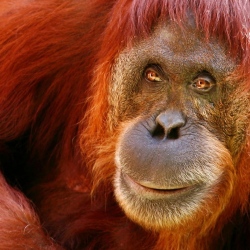
A newly discovered type of anthropoid (precursor to monkeys, apes and humans) has been discovered in a coal mine in Thailand. A team of French anthropologists from Université de Poitiers has been studying the fossil remains (newly named Krabia minuta) and have published a paper describing their findings in Proceedings of the Royal Society B: Biological Sciences.
Those who study human evolution have until recently believed that some types of animals arose in Africa and then evolved to become monkeys, apes and humans. The new thinking is that the precursors to all three developed first in Asia, not Africa, then somehow made their way across an ancient sea to develop into the apes, monkey’s and people we see today. This new find in Thailand bolsters that theory, while also suggesting that some precursors were not precursors at all, but were instead relatives of precursors that either evolved into something else, or went extinct. The tiny primate fossil (estimated to weigh just half a pound when alive) was found in a coal mine and consisted of a single jawbone.
The research team places the fossil to the Late Eocene, approximately 33-35 million years ago. Surprisingly, the teeth on the bone were unlike those of other anthropoids found in Asia, and suggest K. minuta ate fruit and gum, rather than the nuts and insects associated with other anthropoids. This, the researchers suggest, means that the little creature was likely part of group of anthropoids called amphipithecids, that lived throughout Southeast Asia and who all eventually went extinct.
